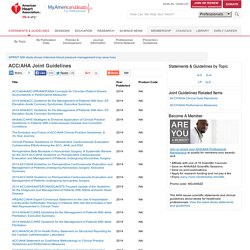

Practice Guidelines: ACC/AHA Release Updated Guideline on the Treatment of Blood Cholesterol to Reduce ASCVD Risk. Key Points for Practice The guideline emphasizes that lifestyle modification remains a critical component of ASCVD reduction.Four groups most likely to benefit from statin therapy are identified: 1.
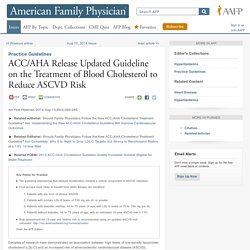
Patients with any form of clinical ASCVD 2. Patients with primary LDL-C levels of 190 mg per dL or greater 3. 4. Ada diabetes guidelines. Asthma qrg. Recommendations by Type: Clinical Practice Guidelines. Recommendations by Type: Clinical Preventive Services. Guidelines > COPD DIAGNOSIS and Management AT-A-Glance Desk Reference. COPD Diagnosis and Management At-A-Glance Desk Reference Updated January 2015 This fold-out pocket card presents essential clinical information from the GOLD Report, Global Strategy for the Diagnosis, Management, and Prevention of COPD.

In a convenient, easy-access format the card provides key reference information on: COPD risk factors Classification of COPD by severity Therapy at each stage of COPD Management of COPD exacerbations GOLD documents are protected by copyright. To read the entire document please download it by clicking here. ManagementofHpylori. 2014 Evidence-Based Guideline for the Management of High Blood Pressure in Adults: Report From the Panel Members Appointed to the Eighth Joint National Committee (JNC 8) Corresponding Author: Paul A.
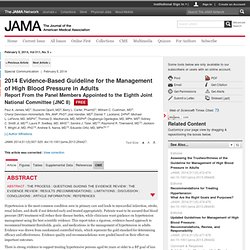
James, MD, University of Iowa, 200 Hawkins Dr, 01286-D PFP, Iowa City, IA 52242-1097 (paul-james@uiowa.edu). Published Online: December 18, 2013. doi:10.1001/jama.2013.284427. Author Contributions: Drs James and Oparil had full access to all of the data in the study and take responsibility for the integrity of the data and the accuracy of the data analysis. Study concept and design, acquisition of data, analysis and interpretation of data, drafting of the manuscript, critical revision of the manuscript for important intellectual content, administrative, technical, and material support, and study supervision: All authors. STD Screening Recommendations - 2015 STD Treatment Guidelines. Skip directly to search Skip directly to A to Z list Skip directly to navigation Skip directly to page options Skip directly to site content Follow STD Sexually Transmitted DiseasesTreatment2015 STD Treatment Guidelines.
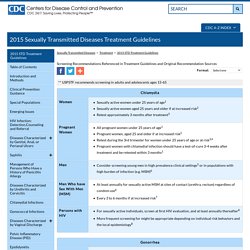
Final Update Summary: Vitamin D Deficiency: Screening - US Preventive Services Task Force. Aaa. Adult schedule. Vaccines - Adult Immunization Schedule, by Vaccine and Age Group. Guidelines. Guidelines. Prostate Cancer Screening Guidelines. American Cancer Society recommendations for prostate cancer early detection. The American Cancer Society (ACS) recommends that men have a chance to make an informed decision with their health care provider about whether to be screened for prostate cancer.
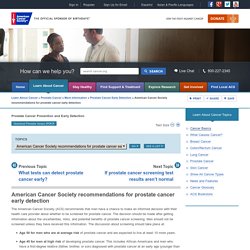
The decision should be made after getting information about the uncertainties, risks, and potential benefits of prostate cancer screening. Men should not be screened unless they have received this information. The discussion about screening should take place at: Age 50 for men who are at average risk of prostate cancer and are expected to live at least 10 more years.
Age 45 for men at high risk of developing prostate cancer. After this discussion, those men who want to be screened should be tested with the prostate-specific antigen (PSA) blood test. If, after this discussion, a man is unable to decide if testing is right for him, the screening decision can be made by the health care provider, who should take into account the patient’s general health preferences and values. American Cancer Society recommendations for colorectal cancer early detection. People at average risk The American Cancer Society believes that preventing colorectal cancer (and not just finding it early) should be a major reason for getting tested.
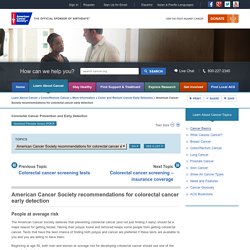
Having their polyps found and removed keeps some people from getting colorectal cancer. Tests that have the best chance of finding both polyps and cancer are preferred if these tests are available to you and you are willing to have them. Fecal immunochemical test (FIT): MedlinePlus Medical Encyclopedia. Blanke CD, Faigel DO.
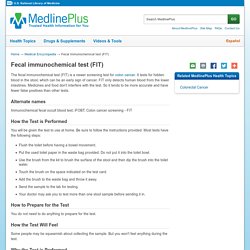
Neoplasms of the small and large intestine. In: Goldman L, Schafer AI, eds.Blanke CD, Faigel DO. Neoplasms of the small and large intestine. American College of Gastroenterology. Abstract Douglas K.
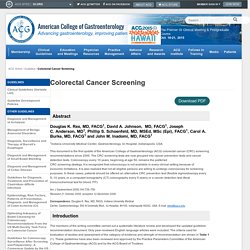
Rex, MD, FACG1, David A. Johnson, MD, FACG1, Joseph C. Anderson, MD1, Phillip S. Schoenfeld, MD, MSEd, MSc (Epi), FACG1, Carol A. Final Update Summary: Breast Cancer: Screening - US Preventive Services Task Force. Flowchart k. Idsaats cap. American Cancer Society recommendations for early breast cancer detection in women without breast symptoms. The importance of finding breast cancer early The goal of screening tests for breast cancer is to find it before it causes symptoms (like a lump that can be felt).
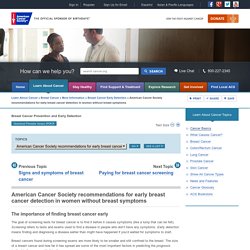
Screening refers to tests and exams used to find a disease in people who don’t have any symptoms. Early detection means finding and diagnosing a disease earlier than might have happened if you’d waited for symptoms to start. Breast cancers found during screening exams are more likely to be smaller and still confined to the breast. The size of a breast cancer and how far it has spread are some of the most important factors in predicting the prognosis (outlook) of a woman with this disease. Most doctors feel that early detection tests for breast cancer help save thousands of lives each year, and that many more lives could be saved if even more women and their health care providers took advantage of these tests. ACC/AHA Joint Guidelines. Skip to Content SPRNT: NIH study shows intensive blood pressure management may save lives ACC/AHA Joint Guidelines Statements & Guidelines by Topic Joint Guidelines Related Items ACCF/AHA Clinical Data StandardsACCF/AHA Performance Measures Become A Member.
